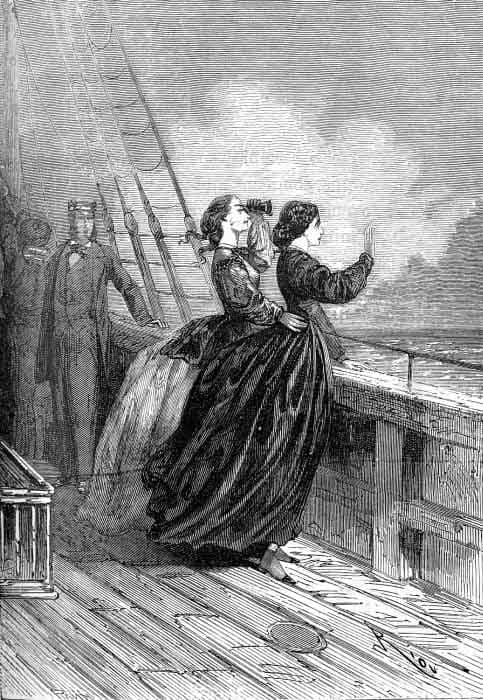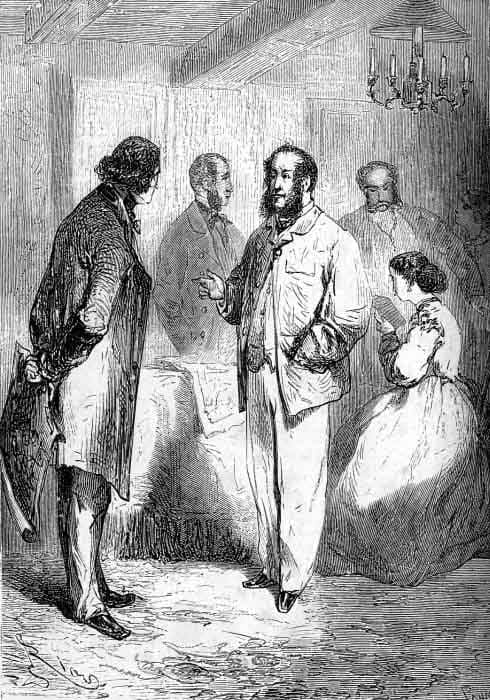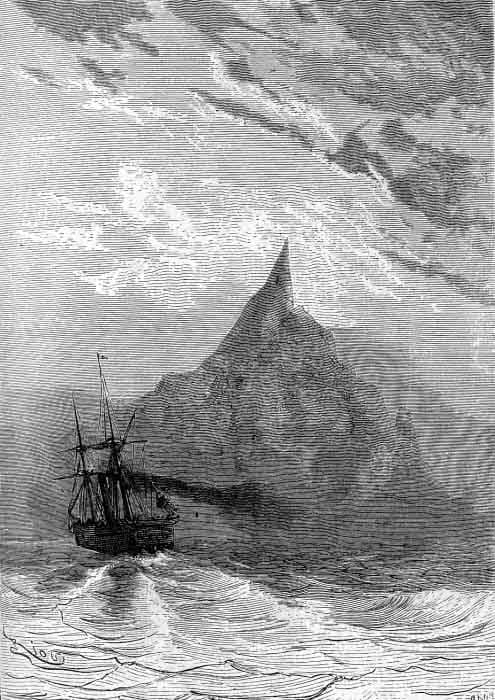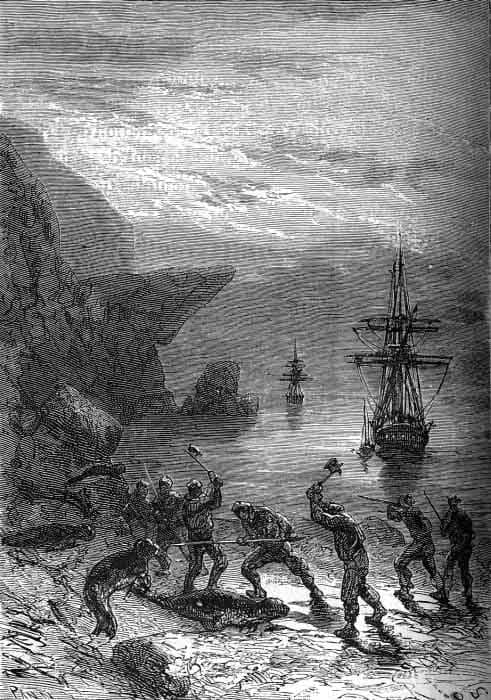CHAPTER XXVII.
A NEW DESTINATION.
The first moments were consecrated to the happiness of meeting. Lord Glenarvan did not wish the joy in the hearts of his friends to be chilled by tidings of their want of success. His first words, therefore, were,—
“Courage, my friends, courage! Captain Grant is not with us, but we are sure to find him.”
It needed only such an assurance to restore hope to the passengers of the Duncan. Lady Helena and Mary Grant, while the boat was approaching the ship, had experienced all the anguish of suspense. From the deck they endeavored to count those who were returning. At one time the young girl would despair; at another she would think she saw her father. Her heart beat quickly; she could not speak; she could scarcely stand. Lady Helena supported her, while Captain Mangles stood beside her in silence. His keen eyes, accustomed to distinguish distant objects, could not discern the captain.
“He is there! he is coming! my father!” murmured the young girl.
But as the boat gradually drew near, the illusion vanished. Not only Lady Helena and the captain, but Mary Grant, had now lost all hope. It was, therefore, time for Glenarvan to utter his assuring words.
After the first embraces, all were informed of the principal incidents of the journey; and, first of all, Glenarvan made known the new interpretation of the document, due to the sagacity of Jacques Paganel. He also praised Robert, of whom his sister had a right to be proud. His courage, his devotion, and the dangers that he had overcome, were conspicuously set forth by his noble friend, so that the boy would not have known where to hide himself, if his sister’s arms had not afforded him a sure refuge.

“You need not blush, Robert,” said Captain Mangles; “you have behaved like the worthy son of Captain Grant.”
He stretched out his arms towards Mary’s brother, and pressed his lips to the boy’s cheeks, which were still wet with tears.
They then spoke of the generous Thalcave. Lady Helena regretted that she could not have shaken hands with the brave Indian. MacNabb, after the first outbursts of enthusiasm, repaired to his cabin to shave himself. As for Paganel, he flitted hither and thither, like a bee, extracting the honey of compliments and smiles. He wished to embrace all on board the Duncan, and, beginning with Lady Helena and Mary Grant, ended with Mr. Olbinett, the steward, who could not better recognize such politeness than by announcing breakfast.
“Breakfast!” cried Paganel.
“Yes, Mr. Paganel,” replied Olbinett.
“A real breakfast, on a real table, with table-cloth and napkins?”
“Certainly.”
“And shall we not eat hard eggs, or ostrich steaks?”
“Oh, Mr. Paganel!” replied the worthy steward, greatly embarrassed.
“I did not mean to offend you, my friend,” said the geographer; “but for a month our food has been of that sort, and we have dined, not at a table, but stretched on the ground, except when we were astride of the trees. This breakfast that you have just announced seemed to me, therefore, like a dream, a fiction, a chimera.”
“Well, we will test its reality, Monsieur Paganel,” replied Lady Helena, who could not help laughing.
“Accept my arm,” said the gallant geographer.
“Has your lordship any orders to give?” inquired Captain Mangles.
“After breakfast, my dear fellow,” replied Glenarvan, “we will discuss in council the programme of the new expedition.”
The passengers and the young captain then descended to the cabin. Orders were given to the engineer to keep up steam, that they might start at the first signal. The major and the travelers, after a rapid toilette, seated themselves at the table. Ample justice was done to Mr. Olbinett’s repast, which was declared excellent and even superior to the splendid banquets of the Pampas. Paganel called twice for every dish, “through absent-mindedness,” as he said. This unfortunate word led Lady Helena to inquire if the amiable Frenchman had occasionally shown his habitual failing. The major and Lord Glenarvan looked at each other with a smile. As for Paganel, he laughed heartily, and promised “upon his honor” not to commit a single blunder during the entire voyage. He then in a very comical way told the story of his mistake in the study of Spanish.
“After all,” he added, in conclusion, “misfortunes are sometimes beneficial, and I do not regret my error.”
“And why, my worthy friend?” asked the major.
“Because I not only know Spanish, but Portuguese also. I speak two languages instead of one.”
“By my faith, I should not have thought of that,” replied MacNabb. “My compliments, Paganel, my sincere compliments!”
Paganel was applauded, but did not lose a single mouthful. He did not, however, notice one peculiarity observed by Glenarvan, and that was the young captain’s attentions to his neighbor, Mary Grant. A slight sign from Lady Helena to her husband told him how matters stood. He gazed at the two young people with affectionate sympathy, and finally addressed the captain, but upon a different subject.
“How did you succeed with your voyage, captain?” he inquired.
“Excellently,” replied the captain; “only I must inform your lordship that we did not return by way of the Strait of Magellan.”
“What!” cried Paganel, “you doubled Cape Horn, and I was not there!”
“Hang yourself!” said the major.
“Selfish fellow! you give me this advice in order that you may share my rope!” retorted the geographer.
“Well, my dear Paganel,” added Glenarvan, “unless we are endowed with ubiquity, we cannot be everywhere. Since you crossed the Pampas, you could not at the same time double Cape Horn.”
“Nevertheless, I am sorry,” replied the geographer.
Captain Mangles now told the story of his voyage, and was congratulated by Glenarvan, who, addressing Mary Grant, said,—
“My dear young lady, I see that Captain John pays his homage to your noble qualities, and I am happy to find that you are not displeased with his ship.”
“Oh, how could I be?” replied Mary, gazing at Lady Helena, and perhaps also at the young captain.
“My sister loves you, Mr. Captain,” cried Robert, “and I do too.”
“And I return your love, my dear boy,” replied Captain Mangles, a little confused by Robert’s words, which also brought a slight blush to the face of the young girl.
Then, changing the conversation to a less embarrassing subject, the captain added,—
“Since I have related the Duncan’s voyage, will not your lordship give us a few particulars of your travels, and the exploits of our young hero?”
No recital could have been more agreeable to Lady Helena and Miss Grant, and Glenarvan hastened to satisfy their curiosity. He told, word for word, all about their journey from ocean to ocean. The passage of the Andes, the earthquake, Robert’s disappearance, his capture by the condor, Thalcave’s fortunate shot, the adventure with the wolves, the boy’s devotion, the meeting with Sergeant Manuel, the inundation, their refuge in the tree, the lightning, the fire, the alligators, the water-spout, the night on the shores of the Atlantic, all these incidents, cheerful or serious, excited alternately the joy and terror of his hearers. Many a circumstance was related that brought Robert the caresses of his sister and Lady Helena. Never was boy more highly praised, or by more enthusiastic friends.
“Now, my friends,” remarked Lord Glenarvan, when he had finished his recital, “let us think of the present. Let us return to the subject of Captain Grant.”
When breakfast was over, the party repaired to Lady Helena’s state-room, and, taking seats around a table loaded with maps and charts, resumed the conversation. Glenarvan explained that the shipwreck had not taken place on the shores either of the Pacific or the Atlantic, and that, consequently, the document had been wrongly interpreted so far as Patagonia was concerned; that Paganel, by a sudden inspiration, had discovered the mistake and proved that they had been following a false trail. The geographer was accordingly asked to explain the French document, which he did to the satisfaction of every one. When he had finished his demonstration, Glenarvan announced that the Duncan would immediately set sail for Australia.
The major, however, before the order was given, asked permission to make a single remark.
“Speak, major,” said Glenarvan.
“My object,” said MacNabb, “is not to invalidate the arguments of my friend Paganel, still less to refute them. I consider them rational, sagacious, and worthy of our whole attention. But I desire to submit them to a final examination, that their validity may be incontestable.”

No one knew what the prudent MacNabb meant, and his hearers listened with some anxiety.
“Go on, major,” said Paganel: “I am ready to answer all your questions.”
“Nothing can be simpler,” said the major. “Five months ago, in the Frith of Clyde, when we studied the three documents, their interpretation seemed clear to us. No place but the western coast of Patagonia could, we thought, have been the scene of the shipwreck. We had not even the shadow of a doubt on the subject.”
“Very true,” added Glenarvan.
“Afterwards,” resumed the major, “when Paganel, in a moment of providential absent-mindedness, embarked on board our vessel, the documents were submitted to him, and he unhesitatingly sanctioned our search upon the American coast.”
“You are right,” observed the geographer.
“And, nevertheless, we are mistaken,” said the major.
“Yes, we are mistaken,” repeated Paganel; “but to be mistaken is only to be human, while it is the part of a madman to persist in his error.”
“Wait, Paganel,” continued the major; “do not get excited. I do not mean that our search ought to be prolonged in America.”
“What do you ask, then?” inquired Glenarvan.
“Simply the acknowledgment that Australia now seems to be the scene of the Britannia’s shipwreck as much as South America did before.”
“Granted,” replied Paganel.
“Who knows, then,” resumed the major, “whether, after Australia, another country may not offer us the same probabilities, and whether, when this new search proves vain, it may not seem evident that we ought to have searched elsewhere?”
Glenarvan and Paganel glanced at each other. The major’s remarks were strictly correct.
“I desire, therefore,” added MacNabb, “that a final test be made before we start for Australia. Here are the documents and maps. Let us examine successively all points that the thirty-seventh parallel crosses, and see if there is not some other country to which the document has as precise a reference.”
“Nothing is easier,” replied Paganel.
The map was placed before Lady Helena, and all showed themselves ready to follow Paganel’s demonstration. After carefully examining the documents, it was unanimously agreed that Paganel’s interpretation was the correct one.
“I leave you, therefore, my friends,” said he, in conclusion, “to decide whether all the probabilities are not in favor of the Australian continent.”
“Evidently,” replied the passengers and the captain with unanimity.
“Captain,” said Glenarvan, “have you sufficient provisions and coal?”
“Yes, my lord, I procured ample supplies at Talcahuana, and, besides, we can lay in a fresh stock of fuel at Cape Town.”
“One more remark,” said the major.
“A thousand, if you please!”
“Whatever may be the guarantees for success in Australia, will it not be well to call for a day or two, in passing, at the islets of Tristan d’Acunha and Amsterdam? They are situated so near our strict line of search, that it is worth our while to ascertain if there be on them any trace of the shipwreck of the Britannia.”
“The unbeliever!” said Paganel.
“I do not want to have to return to them, monsieur, if Australia does not after all realize our newly-conceived expectations.”
“The precaution is not a bad one,” said Glenarvan.


“And I do not wish to dissuade you; quite the contrary,” replied the geographer.
“Well, then, we will adopt it, and start forthwith,” said Lord Glenarvan.
“Immediately, my lord,” replied the captain, as he went on deck, while Robert and Mary Grant uttered the liveliest expressions of gratitude; and the Duncan, leaving the American coast and heading to the east, was soon swiftly ploughing the waves of the Atlantic.

